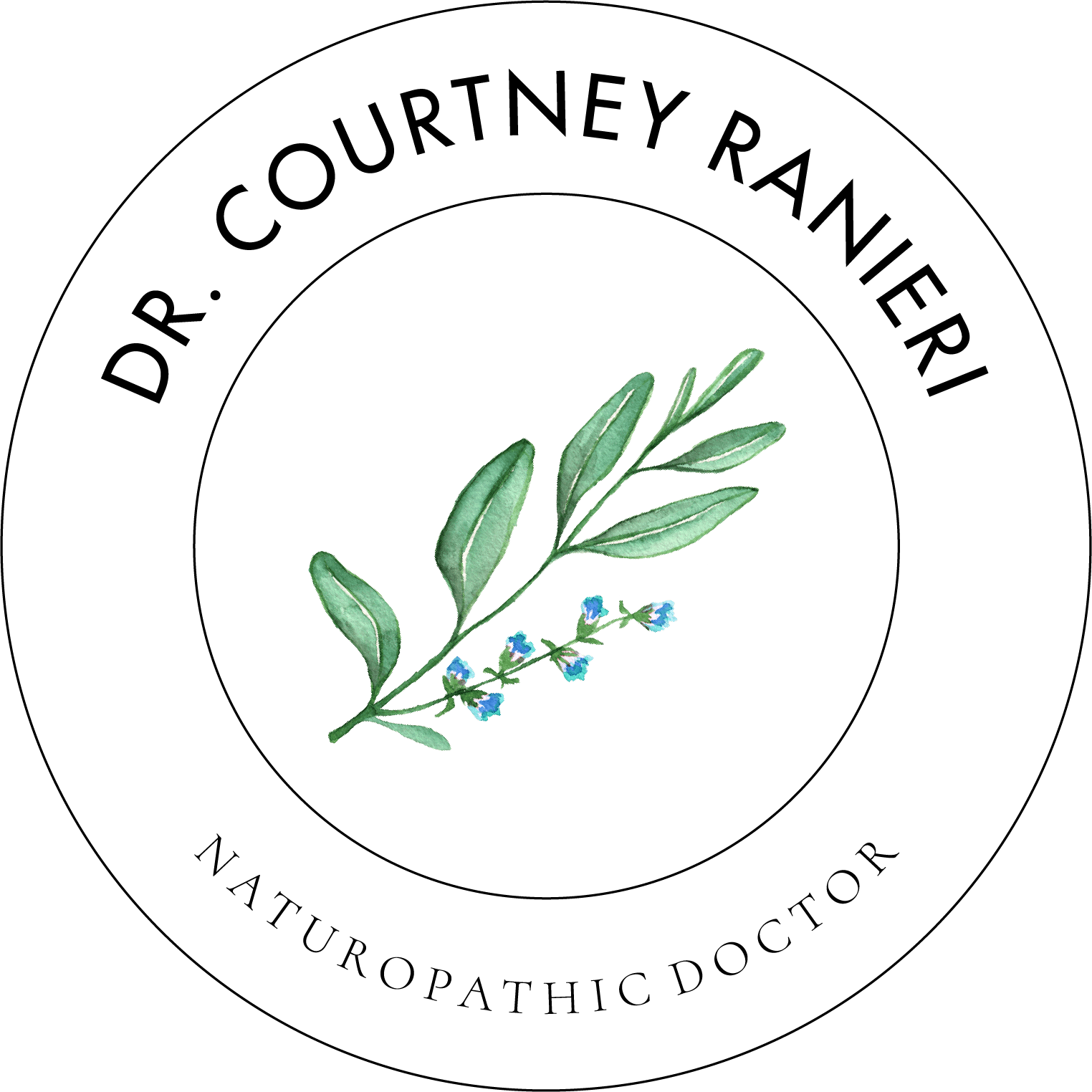Thinking About Trying? Optimizing Preconception Health for Fertility + Pregnancy
So you’re thinking of trying for a little one, now what?
First of all, congratulations! If there is ever a time to start thinking about your health, now is it. Optimizing your preconception health can help to boost fertility, improve the chances of conceiving sooner, foster a healthier pregnancy for mom and help promote healthy growth and development of baby. Preconception care focuses on optimizing nutrition, your hormones and cycles, lifestyle changes and including specific supplementation to help improve your fertility.
Did you know it takes up 90-120 days for an egg and sperm to mature for conception?
Therefore, the best time to start thinking about your preconception health is at least 4 months before trying.
This is true for both partners to ensure the best quality sperm and eggs available.
Nutrition:
Staying well nourished boosts your chances of conceiving
We know that we have to watch what we eat during pregnancy, but starting long before is one of the best way to improve our fertility. The Mediterranean Diet is one of the well-studied diets for conception. The Mediterranean Diet was associated with higher probability to pregnancy (in couples undergoing IVF treatments). Not only that, another study showed that pregnant women who ate a Mediterranean diet had a 32% lower risk of having children with higher birth weight and and accelerated weight gain in childhood which can lead to higher risks of obesity as the child ages.
How to eat Mediterranean-Syle:
- Choose lean sources of proteins like chicken, turkey, fish + legumes and limit red meats
- Boost healthy fats – include healthy sources of fats from avocado, olive oil, olives, nuts and seeds in your meals
- Base every meal around veggies I always tell patients to aim for 1/2 a plate of vegetables!
- Focus on whole-food and whole-grain sources of carbs like sweet potatoes, squashes, quinoa, rice and stay away from processed carbohydrates
- Limit foods containing gluten & dairy (especially low-fat dairy) Studies have shown that low-fat dairy products can make it more difficult to become pregnant.
Nutrition:
What to Be Mindful Of
Alcohol: A growing body of research has linked alcohol consumption with a decreased ability to get pregnant. Studies have shown that women who avoid alcohol while trying to become pregnant had in increased rate of pregnancy.
Coffee + Caffeine: Higher intake of coffee and caffeine can decrease the odds of becoming pregnant and increase the chances of early pregnancy loss. Staying around 200 mg/ day is considered moderate consumption of caffeine.
Note for men: Choose organic foods! One of the most interesting studies I’ve read showed that men who ate the most pesticide-treated foods (ie: not organic foods) had both a lower sperm count and lower-sperm sperm.
Get to Know Your Cycle – Really well!
To put it simply: to become pregnant you must ovulate. Ovulation is the release of an egg from the ovaries into the uterus, where it waits to become fertilized by a sperm. Your ovaries take turns releasing an egg each month, anywhere between Day 12-16 from your first day of your last menstrual period. The egg lives for around 3 days after ovulation, and this is called your fertile window and the time when you’re able conceive. Understanding this cycle and timing intercourse is crucial to boosting your changes of conceiving.
Even if you’ve never thought about ovulation before, now is the time to start keeping track. By keeping track of the signs of ovulation, you can determine if you need to take further steps to determine either why you’re not, or when you are ovulating to optimize your fertility.
A great place to start is to use a period tracking app – both Flo and Clue are both awesome!
Signs That You’ve Ovulated:
- A Change in Cervical Mucous – Your cervical mucous (also known as discharge) changes throughout your cycle and is hugely important for conception. It helps to nourish and transport sperm to the newly released egg. When you ovulate, the mucous changes to an egg-white consistency and becomes more clear and stretchy. This is to help transport sperm to the uterus to fertilize the egg. Before ovulation, the mucous tends to be more cloudy and white.
- An Increase in Body Temperature – Checking your basal body temperature (aka BBT Tracking) is another way to check for ovulation. After ovulating, your temperature increases about 0.4-1 degrees due the rise in progesterone. The best way to take your temperature is at the right when you wake up daily throughout your entire cycle and comparing temperatures.
- Testing for Ovulation: Blood tests, urine and saliva testing are available to test for ovulation as well and these are some tools I use often in practice to help us understand your cycles.
One caveat to this is if you’re using hormonal birth control (The Pill, hormonal IUD or injections), you won’t be able to truly know your natural cycle as it blocks ovulation from occurring, which prevents pregnancy. It can take up to 2 years for your cycle to regulate after coming off of hormonal birth control and Post-Pill Amenorrhea (lack of period) is extremely common. Check out my blog post on The Pill here.
Supplements
Prenatal vitamins are crucial for a healthy pregnancy and should be started long before you become pregnant. Vitamin B12, folic acid, iron and omega 3 are all nutrients recommended by Health Canada for a healthy pregnancy. See below for how I use supplements to help support fertility.
How I Can Help:
I provide Fertility Support to help patients through pre-conception care, pregnancy and beyond. By looking at fertility through a holistic lens, we work towards a comprehensive plan that takes into account all aspects of health and its effect on fertility. I have advanced training in fertility support and offer pre + post IVF acupuncture.
- An Individualized Treatment Plan to help:
- Address underlying concerns (e.g. PCOS, endometriosis, fibroids, thyroid)⠀
- Help you determine if and when you’re ovulating to understand your fertile window
- Improve egg quality and uterine lining health⠀
- Improve sperm health⠀
- Optimize nutrition and pre-conception diet
- Balance hormones
- Regulate menstrual cycles
- Manage stress and lifestyle⠀
- Support integrative fertility methods (IVF, IUI etc)⠀
- Preconception Check-Up
- At our first visit we’ll talk about your goals, reproductive + health history, cycles, complete pre-conception blood tests, physical exams and talk about other conditions that may be making it difficult to conceive like PCOS, thyroid conditions, obesity, autoimmune conditions, endometriosis, diabetes + more.
- Comprehensive Lab Testing
- In order to ovulate, conceive and maintain a pregnancy, we must have optimal levels of hormones. I run comprehensive lab testing if necessary to help us understand your health better and guide treatments to improve fertility. This can include Estrogen (Estradiol), LH: FSH ratio, Progesterone, Insulin and/or HbA1C, TSH (and T3, T4, anti-TPO), Anti-Mullerian Hormone (AMH).
- Pelvic Floor Therapy
- Pre-and-post natal concerns including labor and delivery preparation, pain, leakage, tearing or episiotomy support. Learn more here!
- Integrative Fertility Support
- I’m happy to offer integrative fertility support to help improve fertility alongside other conventional therapy such as IVF, IUI and cycle monitoring.
- Equal Access for All
- I am proud to provide LGBTQ2S friendly services in my practice and provide equal access for all individuals and couples looking to optimize their fertility.
If you are interested in optimizing your hormonal health, fertility + pregnancy support, I am a Naturopathic Doctor in Toronto, Mississauga and Vaughan. I have additional training in Integrative Fertility Methods and would love to help you reach your health goals.
In health,








